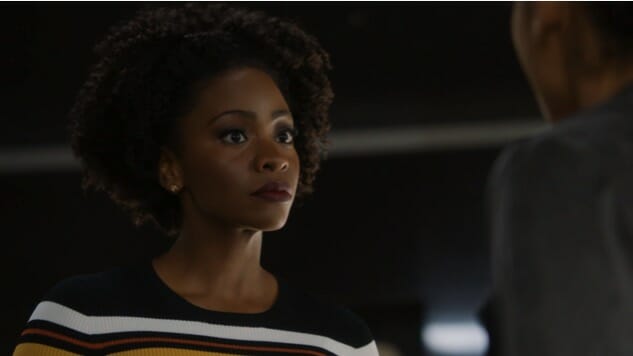And all the wavy, light-skinned girls is lovin’ me now.—Jay Z, “December 4th”
One of my favorite movie scenes of all time shows Bessie Smith, played by Queen Latifah, administering her own reverse paper bag test to backup singers desperate to join her tour. Where the blues singer had been dismissed by so many clubs, for having skin darker than a paper bag, she dismisses all those hopefuls who are lighter than the brown paper bag. Those women will still have a tough time cutting it in the music biz, but at least their lighter skin gives them a fighting chance. All the women in entertainment, at least back then, were light-skinned, and Bessie was going to do her part to give a brown or dark-skinned black woman a chance to shine.
Survivor’s Remorse has become this powerful beam, highlighting all that TV has yet to touch on, even during this Golden Age of peak TV. Serial killers, presidential affairs, mobsters, ad men, monsters in parallel universes—all these and more have come to the small screen, and one of the most surprising things on TV right now is a show offering up a storyline about one of the most common aspects of life… at least for black people.
Last night’s “Photoshoot” (written by Ali LeRoi) centered on Missy Vaughn (Teyonah Parris), now Cam’s Media Consultant, booking a photoshoot for her client. She finds herself under attack after firing the light-skinned model who was hired to replace the dark-skinned model she originally booked to pose with Cam. Parris brilliantly delivers Missy’s point of view, as a business woman who wants to be well-respected for her work, and as a black woman who knows that, if she doesn’t take a stand and use her position to address problems she knows exist, she won’t respect herself after the work is complete. In fact, the work itself lacks relevance, the moment she can’t use it to address an issue that has plagued her since her youth—dark skinned girls are, in so many ways, invisible. From the cotton fields and big houses, to the rap videos and lyrics, to the movies and magazines—dark skinned girls are less than, and deserve the same.
Colorism isn’t natural, but it feels natural, or at least normal. If you’re black, and especially if you’re a black woman, you know where you fall on the paper bag test from the time you’re a child. And we all learn early on, that it’s simply “better” to be light-skinned. Better, prettier, kinder, sexier, smarter. And anyone darker than a brown paper bag gets closer to the opposite end of the spectrum, and is treated (by blacks and whites) accordingly. There is no—or should be no—colorism debate at this point. Any light-skinned woman arguing that things are just as hard for her sounds like the ridiculous model in last night’s “Photoshoot.” As Missy argues on the set of Cam’s shoot, there are few places that a dark-skinned woman can go in the media and entertainment world, and find her beauty praised, or her value celebrated. Missy, then, takes it upon herself to carve out space—however small— for such a celebration.
It’s surprising to me, that this is the first time I’ve really seen colorism presented as a major plot point in a TV series. While this certainly isn’t the first time that a show has made reference to the light skin/dark skin dynamic, colorism as a political and social issue goes largely ignored. This is why much of the American population (white and black) came to the defense of Zoe Saldana’s casting in the Nina Simone biopic. There’s still this false idea that skin tone doesn’t matter as much as, say, race itself. A woman of color playing another woman of color should be perfectly fine—what’s the difference in a few shades, after all?
This is essentially the argument that Missy’s husband Reggie makes (in the wonderful scene that closed out the episode), and it sounds so sensible. Is it that serious? he seems to ask. And I was so relieved when Missy basically responded with an emphatic, unapologetic, “Hell yes.” Anyone with any knowledge of the history of blacks in this country knows that skin tone has always been political, has always been a means of creating a divide among black Americans. “Progress” and visibility for blacks has almost always meant “progress and visibility for light-skinned blacks first” (see everyone from Langston Hughes, to Halle Berry, to Beyoncé, to Barack Obama). Even today, many of our black celebrity activists with the most visibility and the biggest platforms fit this narrative (see Jesse Williams, Amandla Stenberg, Zendaya and others). The entertainment world is complicit in this, and Missy’s refusal to participate is matched by Survivor’s Remorse’s own casting decisions: Parris is joined by Tichina Arnold and Erica Ash. I’m not sure there’s another show on TV right now that can proclaim to have so many black, female leads who pass Bessie Smith’s reverse paper bag test.
My only disappointment in last night’s episode is that we never got to see the dark-skinned model who ended up in the shoot with Cam. “Photoshoot” ultimately gives much voice and visibility to the green-eyed model Missy fires, and it would have been good to at least show us Missy’s victory shot. Still, it has to be said that every episode of this show represents a victory shot for the Missys and Teyonahs of this world—that in and of itself is a thing of beauty.
Shannon M. Houston is a Staff Writer and the TV Editor for Paste. This New York-based writer probably has more babies than you, but that’s okay; you can still be friends. She welcomes almost all follows on
Twitter.
